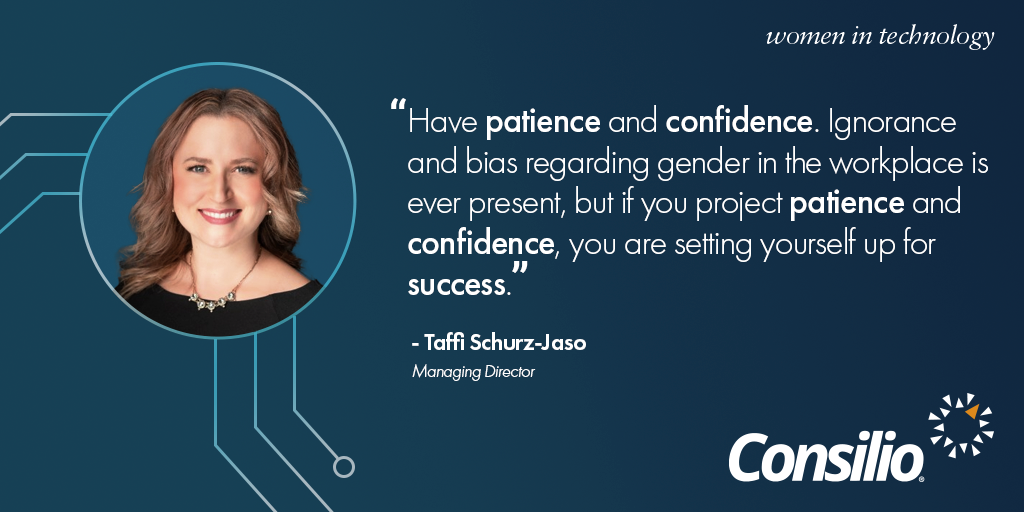 This blog is part of our ongoing Women in Technology series.
This blog is part of our ongoing Women in Technology series.
Taffi started with Consilio as Managing Director of the Central North Region in August 2023. She has over 15 years of experience in legal solutions. She has held Vice President positions in operations, software development, and sales, which has given her a versatile edge in the industry. She has successfully led teams that generated more than $250M in revenue, served as the point on numerous billion-dollar M&A projects, and has a proven track record of presenting, training, growing teams, and performing software implementations such as Concur, on a global scale.
Taffi has a Master’s degree in Organizational and Professional Communication and Development, is Lean Six Sigma Certified, a certified PMP, carries several certifications in the Legal Solutions space, and is frequently asked to be a speaker. In Taffi’s personal life, she is married, has two pre-teen children, a loveable Aussidoodle, and a sinister Siberian cat who all keep her on her toes.
How did you get into this industry?
I dove into eDiscovery as a fluke. I was teaching at Clemson University at the time and made a trip to Chicago to visit family and friends. I was introduced to Andrew Sieja socially and he passionately told me about his twelve-person software company. My background is in Organizational Development, so I asked if he had anyone to create their knowledge base or train their clients. Being such a small organization, you can guess the answer…it was a loud NO. I was brought on as staff number 13, aided in the creation of the first Relativity manual – it was under 100 pages back then – and trained and supported new Relativity converts. The rest is history!
What were some pivotal moments in your career that helped to get you to where you are today?
My first pivotal moment involved risk, and I’m glad I made the uncomfortable decision to follow through. While I was teaching at Clemson, I had plans to move into the corporate world at some point. When the possibility of working in eDiscovery presented itself, it was extremely risky to leave the world of academia to join an untested software company. I took a chance, and it has paid off with an interesting and rewarding career. I have always thanked Andrew for bringing me into the fold.
Other pivotal moments involve discovering and collaborating with leaders who shared my vision and goals. Two favorites include, Nelson Bagnardi, who taught me how to be a strong and caring leader as a college student, and John Marshall who had a vision, and trusted that he had hired the right person to execute it. I cannot emphasize enough how important it is to grow your career around individuals who believe in you, support your decisions, and let you do what you do best…your job.
Have you ever noticed a time in your career where your gender proved to differentiate you?
Yes, and unfortunately, not in a positive way. While those times are not the norm, thankfully, they were jarring nonetheless. Three examples that stick out include the following: There were multiple times where I was told to “not get upset” because it wasn’t an attractive look on a woman when I disagreed with male colleagues in meetings. I’ve ridden in taxis with male leaders at my level and above and was asked (the only female in the group) to pay for the cab and then hustle to get people coffee. Lastly, I was told that I needed to be more “vulnerable” at work. When asked if any male leaders were told this, the answer was No, and it wasn’t because they exuded vulnerability. It’s because I was a confident woman, and that made some male leaders uncomfortable.
What is your advice for someone working in a predominately male workplace?
The two most important pieces of advice I would give a female colleague is to have patience and confidence. Ignorance and bias regarding gender in the workplace is ever present, but if you project patience and confidence, you are setting yourself up for success. Too many women doubt their own expertise because they are questioned, told they are too bold, and/or consistently passed over for development opportunities.
What I would say to this is, “Stay. The. Course.”
Let them question you. Your voice is just as important as everyone else’s. You were hired for a reason, and nothing good ever comes from Groupthink. The best advocate for you, is you alone, so be bold! Research shows that male colleagues take greater risks. Try that on for size and you will personally set yourself up for greater success.
What do you think companies could do to motivate more women to pursue careers in technology?
In addition to the standard areas, such as equal pay and opportunities, mentorship, inclusivity training, and establishing feedback mechanisms, the following four intertwined initiatives would help women get a seat at the table.
- Transparency – If organizations are serious about this initiative, there is transparency at every level on female headcount. Many times, organizations claim diversity, but when you get to the bottom of it, their junior-level positions are well represented, but the number of women in senior leadership roles is abysmal.
- Representation – Showcase women in tech roles (like this forum!) on both external and internal communications to demonstrate that women are successful in these careers.
- Diverse Leadership – Women need to be hired and promoted into positions of leadership. Having diversity inclusive employee resource groups is not enough. The public will not believe that a company practices diverse hiring and promoting practices if they look at leadership and see no female faces.
- Recognition and Awards – It’s tough for women in tech. That’s the reality. Ensure that women in these areas are being recognized for their contributing work.